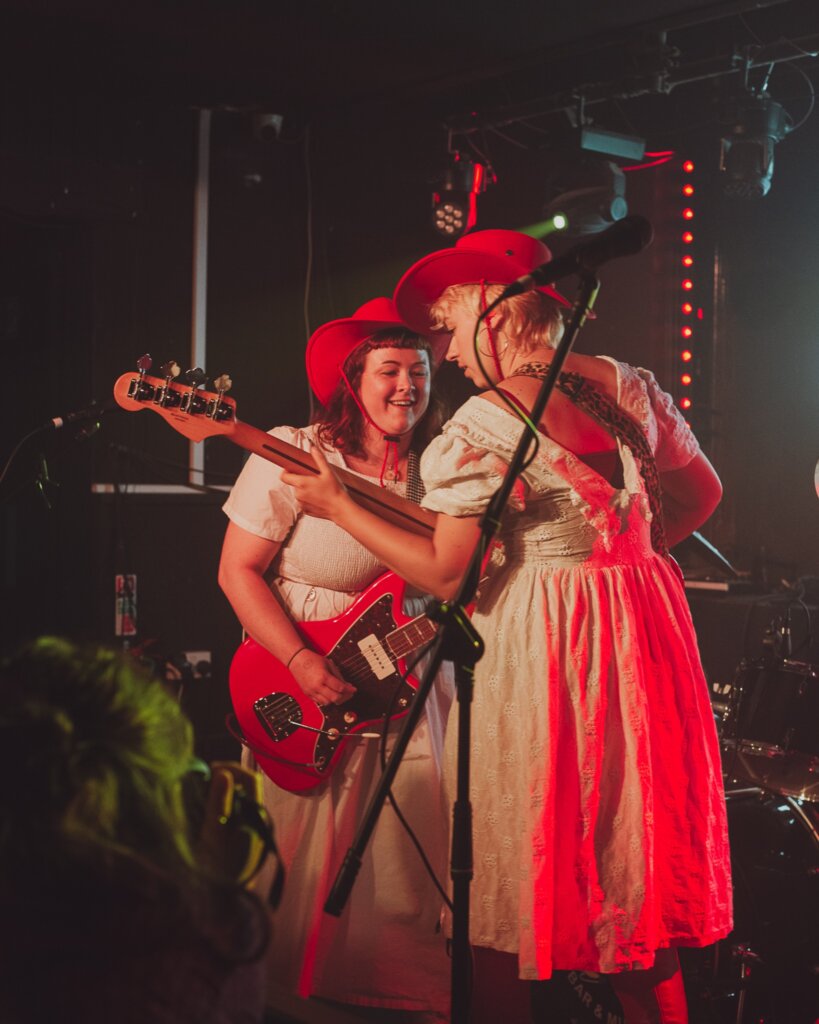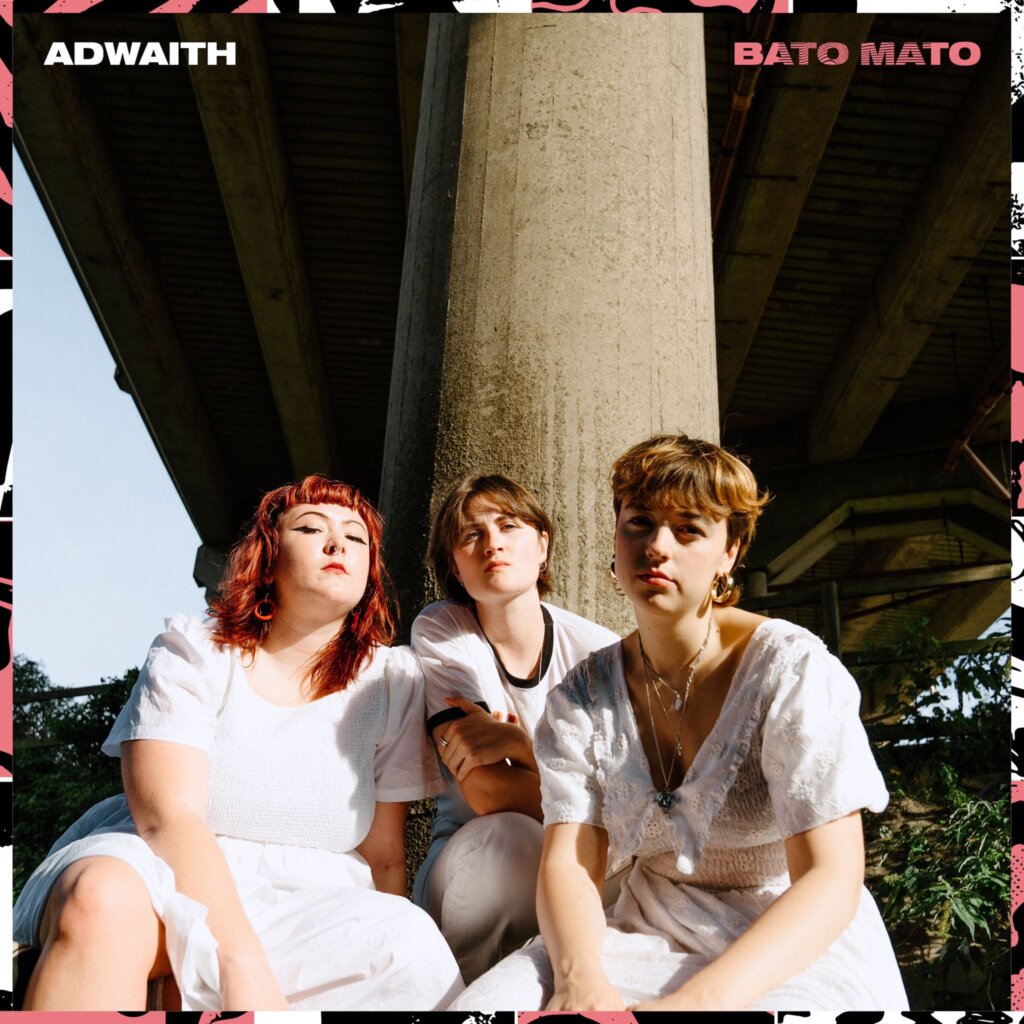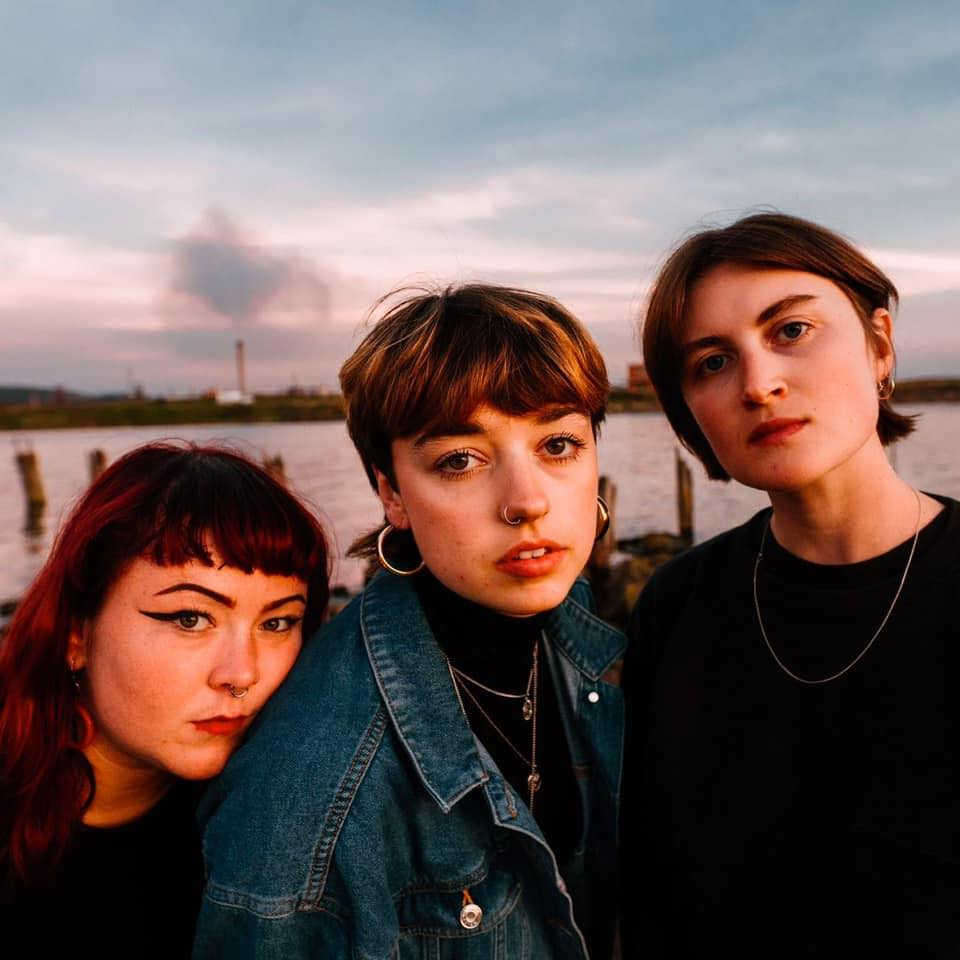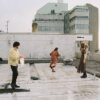The last time Adwaith played Merseyside was on Welsh Language Music Day 2020. A lunchtime set at Liverpool’s Pier Head in a pop music museum closed specially for the event thereby confusing the public, it was left to a tight knit audience of Welsh music enthusiasts to attend and swoon accordingly. The clouds and sky were grey and damp outside as the band performed songs from critically acclaimed and much beloved debut album the Welsh Music Prize-winning Melyn, on a specially built stage in a listed building and surrounded by pop memorabilia of legends past. It’s two and a half years since then and they’re back in the region at the end of the month at Future Yard in Birkenhead, less than a mile away, and my goodness how much has changed for Hollie Singer (vocals, guitar), Gwenllian Anthony (bass and lots of other things) and Heledd Owen (drums).
The first six months of 2022 has seen their star rise; the trio started this year fighting fit and as they meant to go on, with a packed gig in Wrexham. The night served as a delicious aperitif for what was to come, our sheroes headlining at Clwb Ifor Bach in Cardiff in April as part of the 6 Music Festival Fringe, selling out in four brief minutes. Adwaith have long since been supported by Welsh radio and BBC Introducing‘s Adam Walton, but now the list of names in the Adwaith fan club has rapidly lengthened and broadened; after they supported IDLES at Cardiff’s Motorpoint Arena in April (‘it was out of this world. We weren’t expecting that many people to be there!’) Joe Talbot and his bandmates nominated Adwaith to play Glastonbury; Tim Burgess granted a listening party, Tom Robinson described them onstage as ‘the real deal’. They are now being cited on new artists press releases ‘for fans of Adwaith’ (‘that is crazy to think about!’) and the Manics‘ James Dean Bradfield – who remixed single ‘Gartref’ back in 2018 – went along to wet new album Bato Mato’s head at the launch show at Clwb by snapping up Adwaith t-shirts for his wife and daughter. Oh, and the band never seem to be off the radio. But more of that later.
When we talk over zoom about Bato Mato and reflect on how things have shifted for them, the band seem surprised to realise it’s been not far off four years since Melyn came out. But then, 2018 seems a million years ago to all of us. The three of them are in their rehearsal barn in rural west Wales, Heledd’s father brings them coffee and snacks halfway through our conversation. It sounds they have supportive families; early gigs they recall consisted of their parents and a few intrigued music heads.
So yep they’ve come a long way indeed, literally and creatively. They were loosely described a post punk for Melyn, but they’ve expanded way beyond that, – read our review of Bato Mato here. Melyn was written by the three as still relatively open-eyed teenagers; Bato Mato finds them with feet on the ground, the collective mindset not bleak exactly but rooted in reality. ‘We’re boring and depressing people!’ laughs Hollie.
They are no such thing but did intend they stress, for Bato Mato to emphasise a sense of darkness. ‘We were very hopeful with Melyn. When you’re in your teens, you don’t really understand what life is like,’ Gwen recalls. ‘You do think that “I’m gonna go to university, and then I’m gonna get this job, and then I’m gonna do this and that and that and have this plan”. And then you realize like, that doesn’t always happen. And then you feel you don’t know what to do. You feel pressure. Or feel like you’re falling behind everyone else. When you see other people do well.’
It’s perhaps a sign of the times the early twenties of previous generations were more carefree.
‘It’s something to do with social media as well. You see people doing things, you’re like, oh, maybe I should be doing that. Or maybe I’m not doing the right thing or not progressing as fast as everyone else.’
But It’s not all doom and gloom, not by any stretch. Let’s not ignore the glimmers of hope on the record. There are some beautiful elements on Bato Mato as well.
Is it alright for me to say that? I ask. You look appalled.
‘How dare you!’ jokes Gwen. ‘I think definitely in ETO and Amser Codi , have those optimistic pop elements to it. You’re fine to say beautiful!’
‘With this one we’ve got different heads on our shoulders,’ says Hollie. ‘A bit more in gear, like we’re already thinking about and writing the third album. We’re just trying to be one step ahead and be more…’
‘Mature,’ adds Heledd.
Hollie nods. ‘Definitely.’

Photo credit: Jack Moyse
Adwaith have been called trailblazers, reaching the parts other artists performing in their native tongue of Welsh don’t quite reach. Hollie, Gwen and Heledd consistently release music and increasingly perform outside Wales; festivals around UK and indeed the world and London of course. They’re coming to my neck of the woods Birkenhead at the end of July, did I mention that? ETO – co-written with co-wrote this with whenyoung collaborator Gethin Pearson – and ‘Wedi Blino‘ were playlisted by 6 Music, a massive coup. The responses and vibe to hearing them so much on the radio since early spring this year, and a recent tweet by a woman who said her young daughter had been delighted to hear a song in Welsh floating across the airwaves into her kitchen as she got ready for school, feels reminiscent of Gorky’s ‘Patio Song‘ blasting out on Radio One when tucking into one’s cornflakes at breakfast time in 1990s. Adwaith once again look a bit stunned at the comparison.
‘Interesting, comparing that,’ says Heledd slowly. ‘That’s really good obviously. I guess when you’re doing it you don’t really feel, see what’s happening really.’
‘I guess we’re still in a little bubble,’ adds Gwen. ‘It’s not like we’re looking from the outside at what we do. It’s so nice to be that band that makes people go, “wow it’s so amazing to hear Welsh music on the radio” or whatever.’
Bato Mato is named after the band’s guide during their 2020 trip to Siberia. Once upon a time people were exiled to Sibera for being bad or rebellious, or the unfortunate sent and used for slave labour. But happily, Adwaith got to go there for being very, very good. They made the trip courtesy of FOCUS Wales with little idea what to expect. It was bone chillingly cold upon arrival and as they drove around the largely deserted streets of destination Ulan-Ude, the third largest city in Russia, it was so cold the locals stayed wrapped up inside. Disconcerted by the sight of their own faces staring down at them from giant billboards at every turn, the city seemed empty to Adwaith, emphasizing to our adventurers the loneliness and desolation of the landscape. There were no shops and access to everyday things was a challenge; Hollie tried to order a pizza and describes the experience as borderline traumatic, the most difficult thing she’s ever done. They did two shows, one in an arena and another in a sex club. They gave a talk, answering questions about being female in a band – such a concept is highly unusual in those parts.
‘They really don’t see that a lot in Russia. They were a bit blown away by us and intrigued and looked at us a bit funny. Everyone was loving it, a lot doesn’t go on there where we played so when someone is on everyone goes nuts for it,’ she says.
To the residents of Ulan-Ude, Adwaith were literal superstars. A band from Wales coming to this largely forgotten city. ‘We were famous for a few days,’ says Gwen. ‘Bizarre.’
They explored the place, went to a Bhuddist temple and got shown a mummified body of a man who died in 1920s. He sat in a glass cabinet surrounded by finery.
‘And they were saying this, this guy’s still alive, he’s reached Nirvana. He still had hair growing. We weren’t allowed to turn our backs to him. I was just so gobsmacked the whole time. It was mad. One of the monks was going, “he will always be with you” and hung this scarf around my neck!’ laughs Hollie.
This trip had an effect; by this time the band were writing the follow up to Melyn. But they returned home newly energized and inspired by their experience. Oddly, a sense of familiarity with their hometown resonated. Rural towns can feel as if they exist with one foot in the past, not quite developed with the times. Songs Adwaith had written for album number two got lashed; upon reflection, they weren’t as much of a step up as wanted. An adaptation of the Welsh folk song ‘Lan y Môr‘ (Beside The Sea) and ‘Oren‘, a Welsh reworking of 2019 single ‘Orange Sofa‘ survived. The combination of the trip and being in a lockdown gifted Adwaith the time to think and ask themselves what direction they would go in next. ‘We were so busy before we didn’t really have time to pause for a minute and go, right what actually do we want, what direction you want to go in? the lockdown kind of give us that time to think things through a bit,’ Gwen recalls.

They wrote the new songs remotely, by the time they headed to the studio with producer Steffan Pringle they hadn’t rehearsed or played the songs together, another unique approach. Gwen had bought world music instruments from Cash Converters, every musician’s payday treat. You can find all sorts in any branch, and Gwen’s local is no different.
‘I don’t know where they got them from. I had no idea what they were, the people in the shop didn’t know what they were. A Chinese instrument, a Turkish cumbus and an accordian.’ There was an electric sitar already in the studio, so that got utilized as well.
So Bato Mato was created out of travel and movement, a melting pot of cultures – Wales, Siberia, and lands they’ve never been to but summon and feed off through instrumentation. It made things interesting, says Gwen. ‘That’s what makes the album sound different, having all these different elements to it. Like at the start of Cwympo the “don-dong-dong” at the start the cumbus is such an interesting middle eastern sound.’
It sou ds like they had fun creating the album; the pretty but unsettling instrumental ‘Toddi‘ is quite different from the songs surrounding it, slightly eerie like a haunted musical box with faeries causing creepy mischief. Gwen played piano and the ghostly noises are Adwaith themselves munching on the healthy snack of lentil kale crisps, talking and laughing. The rustling noises we hear are three women enjoying a good nosebag.
With Bato Mato, experimenting with sounds is one thing they’ve explored further, along with the notion of using language as an instrument. For a band whose growing audience does not have a strong grasp of Welsh, this makes sense and it’s an approach utilized by artists – they cite Can and Khruangbin as established examples.
‘We thought more about the sounds of the words than the lyrics. It opens a lot of doors to experiment with sounds and words. Songs don’t necessarily have to make sense. I feel it’s good to get out of that mindset. I think we’ll probably do that for the third album as well. Play around with different words,’ says Gwen.
What would they like the album to achieve? Have they thought about that? There’s a long silence. It’s a big question, they admit. But one worth asking – they have come so far. This weekend they were featured in the Times newspaper in an article How grime is your valley? focusing on their dedication to performing in Welsh; despite considerable wins like this there is still a way to go before editors and other music industry gatekeepers enthusiastically welcome music not in English. Journalists can pitch and pitch but if editors won’t budge or see the value it’s hard. There are strong arguments that the public has an appetite for music of all languages – Sigor Ros is oft referred to but the British public more than happily enthuse over the Eurovision annually, the Kalush Orchestra’s ‘Stefania’ win was not a mere empathy vote.
Hollie offers the ambition for Bado Lato ‘to normalize Welsh language music and make it..’
‘More mainstream,’ suggests Gwen. ‘And accessible.’
Heledd sees building a broader audience for Adwaith in their future. ‘We’re already starting to gig places we don’t normally go to. Like Birkenhead.’
And more records too. After we sign off, they’ve got an evening ahead of cracking on with writing the third album.
‘We’re staying one step ahead. Not four year gap between albums this time!’ says Gwen.
Listening to Huw Stephens on his Radio Wales show not long ago he was talking about how the lines defining Welsh music have blurred, there’s less separation now. After all, Welsh Language music is not a genre and should not stand alone and give itself boundaries or have any forced upon it. The pilot gigs organised by distributor PYST back in 2019 where Adwaith, Papur Wal, Mellt, SYBS, Ynys and more played short tours taking in Manchester, London and Glasgow bringing their music across the genres to new audiences – and as importantly, to venues and promoters.
For Adwaith, they want to take their language and music global.
‘I feel there has been for a while that thing where Welsh Language music was its own scene that wouldn’t go outside of Wales and it wasn’t accessible to non-Welsh language speaking people,’ Gwen concludes. ‘But you can see that line blurring now, people and outside in Wales who don’t speak Welsh are listening to it, it can only be a good thing. We’re very honoured to be part of that journey.’
Bato Mato is out now via Libertino Records.
Adwaith play:
22nd-24th July – Nozstock Festival
30 July – at Future Yard, Birkenhead – with Kim Hon, Ani Glass
18th August – Green Man Festival
28th-2nd September – Calgary, Canada




